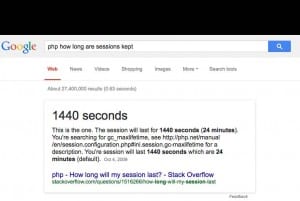If you are using structured data on your website, or marking up your website’s code using schema.org code, it could ultimately cost you page views and visits from Google. By allowing marking using structured data on your website, you are allowing Google to use the data in any way they see fit–and Google is taking full advantage of that.
Let’s take, for example, a site like Stack Overflow, a site that is a “language-independent collaboratively edited question and answer site for programmers.” Lots of programmers/developers use it to find code that they need. Stack Overflow uses a lot of structured data, and marks up their site’s code it.
In a recent post, Mattias points out that Google is directly embedding Stack Overflow responses in the Google search results. Once the user has the answer, they don’t need to click and visit Stack Overflow’s website. As a result, they lose page views, visitors, and traffic. Let’s look at a specific example. If you search for “php how long are sessions kept” Google gives you the answer, see below:
The answer is embedded in the Google search result for that search query, and most likely the user gets the answer and doesn’t then have to click to the site. If I just wanted the answer to that search query, which is 1440 seconds, then why would I want to click to the site?
The Stack Overflow site has plenty of schema.org markup, which, essentially gives Google “free reign” when it comes to using whatever is marked up. Google can essentially use any of it without formal permission from Stack Overflow, and they certainly don’t have to pay you to use it.
By marking up your site with schema.org code (structured data), you’re allowing Google to use your content without your permission.
This is a really important distinction here: Google is improving their search results with your content. And they’re not compensating you for it. In fact, you’re ultimately going to lose page views and traffic, as in the Stack Overflow case. For certain search queries, Google is using the structured data to answer search queries. And if the searcher gets the answer from Google’s search results without having to go to your website, then they won’t click to your website. Your site will lose visitors, lose page views, and lose traffic.
Granted, Google has essentially been “stealing” our traffic for many, many years now. For example, Google has had the “define” search query available for at least 10 years (as I remember). If you search for:
define:search engine optimization
Google will give you the answer to that, and for many years they would give you several different definitions of a word or phrase. Only fairly recently have they switched to typically providing only one definition in the search results.
But in the the case of schema.org, and structured markup, it’s very important to consider which content you’re actually marking up, and which information that you’re giving Google permission to use in their search results. Google is, in fact, a for-profit company, and their goal is to provide you with the best search results. If they can get the information that a searcher is looking for (for free) and present it to that searcher in the search results, then they’re going to do it. Google doesn’t have to send that visitor to your website. And they won’t if they can help it.

